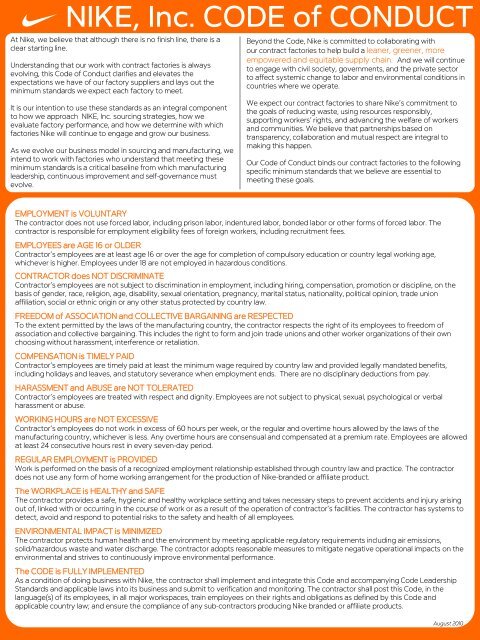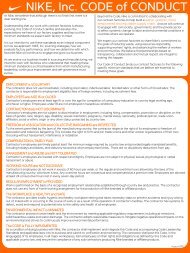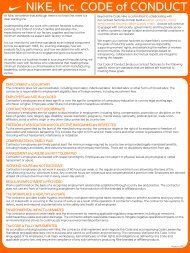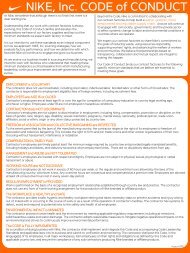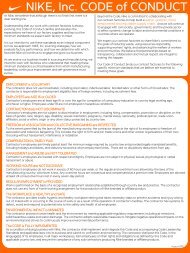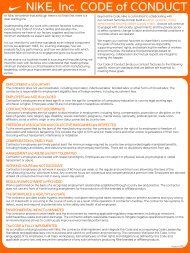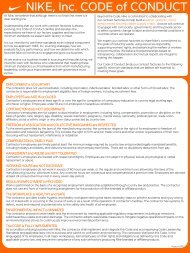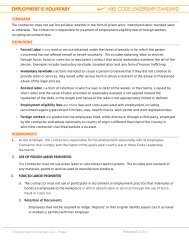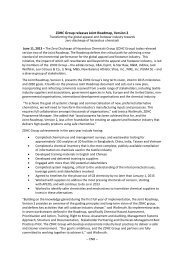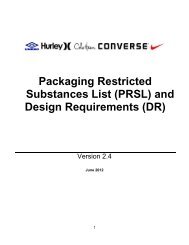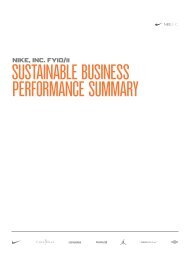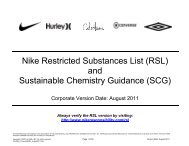Freedom of Association - NIKE, Inc. - The Journey
Freedom of Association - NIKE, Inc. - The Journey
Freedom of Association - NIKE, Inc. - The Journey
You also want an ePaper? Increase the reach of your titles
YUMPU automatically turns print PDFs into web optimized ePapers that Google loves.
S <strong>NIKE</strong>, <strong>Inc</strong>. CODE <strong>of</strong> CONDUCT<br />
At Nike, we believe that although there is no finish line, there is a<br />
clear starting line.<br />
Understanding that our work with contract factories is always<br />
evolving, this Code <strong>of</strong> Conduct clarifies and elevates the<br />
expectations we have <strong>of</strong> our factory suppliers and lays out the<br />
minimum standards we expect each factory to meet.<br />
It is our intention to use these standards as an integral component<br />
to how we approach <strong>NIKE</strong>, <strong>Inc</strong>. sourcing strategies, how we<br />
evaluate factory performance, and how we determine with which<br />
factories Nike will continue to engage and grow our business.<br />
As we evolve our business model in sourcing and manufacturing, we<br />
intend to work with factories who understand that meeting these<br />
minimum standards is a critical baseline from which manufacturing<br />
leadership, continuous improvement and self-governance must<br />
evolve.<br />
Beyond the Code, Nike is committed to collaborating with<br />
our contract factories to help build a leaner, greener, more<br />
empowered and equitable supply chain. And we will continue<br />
to engage with civil society, governments, and the private sector<br />
to affect systemic change to labor and environmental conditions in<br />
countries where we operate.<br />
We expect our contract factories to share Nike’s commitment to<br />
the goals <strong>of</strong> reducing waste, using resources responsibly,<br />
supporting workers’ rights, and advancing the welfare <strong>of</strong> workers<br />
and communities. We believe that partnerships based on<br />
transparency, collaboration and mutual respect are integral to<br />
making this happen.<br />
Our Code <strong>of</strong> Conduct binds our contract factories to the following<br />
specific minimum standards that we believe are essential to<br />
meeting these goals.<br />
EMPLOYMENT is VOLUNTARY<br />
<strong>The</strong> contractor does not use forced labor, including prison labor, indentured labor, bonded labor or other forms <strong>of</strong> forced labor. <strong>The</strong><br />
contractor is responsible for employment eligibility fees <strong>of</strong> foreign workers, including recruitment fees.<br />
EMPLOYEES are AGE 16 or OLDER<br />
Contractor’s employees are at least age 16 or over the age for completion <strong>of</strong> compulsory education or country legal working age,<br />
whichever is higher. Employees under 18 are not employed in hazardous conditions.<br />
CONTRACTOR does NOT DISCRIMINATE<br />
Contractor’s employees are not subject to discrimination in employment, including hiring, compensation, promotion or discipline, on the<br />
basis <strong>of</strong> gender, race, religion, age, disability, sexual orientation, pregnancy, marital status, nationality, political opinion, trade union<br />
affiliation, social or ethnic origin or any other status protected by country law.<br />
FREEDOM <strong>of</strong> ASSOCIATION and COLLECTIVE BARGAINING are RESPECTED<br />
To the extent permitted by the laws <strong>of</strong> the manufacturing country, the contractor respects the right <strong>of</strong> its employees to freedom <strong>of</strong><br />
association and collective bargaining. This includes the right to form and join trade unions and other worker organizations <strong>of</strong> their own<br />
choosing without harassment, interference or retaliation.<br />
COMPENSATION is TIMELY PAID<br />
Contractor’s employees are timely paid at least the minimum wage required by country law and provided legally mandated benefits,<br />
including holidays and leaves, and statutory severance when employment ends. <strong>The</strong>re are no disciplinary deductions from pay.<br />
HARASSMENT and ABUSE are NOT TOLERATED<br />
Contractor’s employees are treated with respect and dignity. Employees are not subject to physical, sexual, psychological or verbal<br />
harassment or abuse.<br />
WORKING HOURS are NOT EXCESSIVE<br />
Contractor’s employees do not work in excess <strong>of</strong> 60 hours per week, or the regular and overtime hours allowed by the laws <strong>of</strong> the<br />
manufacturing country, whichever is less. Any overtime hours are consensual and compensated at a premium rate. Employees are allowed<br />
at least 24 consecutive hours rest in every seven-day period.<br />
REGULAR EMPLOYMENT is PROVIDED<br />
Work is performed on the basis <strong>of</strong> a recognized employment relationship established through country law and practice. <strong>The</strong> contractor<br />
does not use any form <strong>of</strong> home working arrangement for the production <strong>of</strong> Nike-branded or affiliate product.<br />
<strong>The</strong> WORKPLACE is HEALTHY and SAFE<br />
<strong>The</strong> contractor provides a safe, hygienic and healthy workplace setting and takes necessary steps to prevent accidents and injury arising<br />
out <strong>of</strong>, linked with or occurring in the course <strong>of</strong> work or as a result <strong>of</strong> the operation <strong>of</strong> contractor’s facilities. <strong>The</strong> contractor has systems to<br />
detect, avoid and respond to potential risks to the safety and health <strong>of</strong> all employees.<br />
ENVIRONMENTAL IMPACT is MINIMIZED<br />
<strong>The</strong> contractor protects human health and the environment by meeting applicable regulatory requirements including air emissions,<br />
solid/hazardous waste and water discharge. <strong>The</strong> contractor adopts reasonable measures to mitigate negative operational impacts on the<br />
environmental and strives to continuously improve environmental performance.<br />
<strong>The</strong> CODE is FULLY IMPLEMENTED<br />
As a condition <strong>of</strong> doing business with Nike, the contractor shall implement and integrate this Code and accompanying Code Leadership<br />
Standards and applicable laws into its business and submit to verification and monitoring. <strong>The</strong> contractor shall post this Code, in the<br />
language(s) <strong>of</strong> its employees, in all major workspaces, train employees on their rights and obligations as defined by this Code and<br />
applicable country law; and ensure the compliance <strong>of</strong> any sub-contractors producing Nike branded or affiliate products.<br />
August 2010
FREEDOM OF ASSOCIATION<br />
STANDARD<br />
To the extent permitted by the laws <strong>of</strong> the manufacturing country, the contractor recognizes and respects<br />
the right <strong>of</strong> employees to freedom <strong>of</strong> association and collective bargaining. This includes the right to form<br />
and join trade unions and other worker organizations <strong>of</strong> their own choosing without harassment, interference<br />
or retaliation.<br />
DEFINITIONS<br />
• Bargain in good faith is to regularly meet and discuss with a willingness to reach an agreement.<br />
• Blacklisting is creating, maintaining, using and/or communicating lists <strong>of</strong> employees or potential<br />
employees for the purpose <strong>of</strong> denying employment or other penalty based on legally protected<br />
status or non-job related criteria.<br />
• References to union or trade union through out this Code Leadership Standard also apply to other<br />
worker organizations as may be applicable.<br />
REQUIREMENTS<br />
1. As the employer, the contractor is responsible for the employment relationship with its employees.<br />
Contractor shall comply with the higher <strong>of</strong> the applicable country law or these Code Leadership<br />
Standards.<br />
2. RIGHT TO FREELY ASSOCIATE<br />
a. In countries where country law recognizes employees’ rights to form and join trade unions and other<br />
worker organizations <strong>of</strong> their own choosing without interference and to bargain collectively,<br />
contractor shall comply with country law and the requirements <strong>of</strong> this Code Leadership Standard.<br />
<strong>The</strong>se rights continue through the course <strong>of</strong> employment, including eventual termination <strong>of</strong><br />
employment.<br />
b. Employees have the right to join or not to join trade unions or other worker organizations <strong>of</strong> their own<br />
choosing.<br />
c. Where country law substantially restricts freedom <strong>of</strong> association, the contractor shall facilitate<br />
alternative means to individually and collectively engage with its employees and for employees to<br />
express their grievances and protect their rights regarding working conditions and terms <strong>of</strong><br />
employment. At a minimum, this means having an effective grievance process (see paragraph 6<br />
below).<br />
In addition, to the extent permitted by law, the contractor is encouraged<br />
to support the establishment <strong>of</strong> worker committees freely chosen by its<br />
employees.<br />
d. Union Dues. <strong>The</strong> contractor shall not deduct union membership dues, fees, fines, or other<br />
assessments from employees’ wages without the express and written consent <strong>of</strong> the individual<br />
<strong>Freedom</strong> <strong>of</strong> <strong>Association</strong> CLS – Page 1 03.15.10
FREEDOM OF ASSOCIATION<br />
employee, unless otherwise specified in a freely negotiated and valid collective bargaining<br />
agreement or when required by law<br />
e. Union representatives should have access to their members under conditions established by country<br />
law or mutual agreement between the contractor and the union.<br />
<strong>The</strong> contractor is encouraged as a good practice to allow reasonable time <strong>of</strong>f<br />
with pay for employee union representatives to carry out their duties, such as<br />
grievance handling and representing members, and provide such facilities as<br />
may be reasonably required to enable the representatives to function effectively.<br />
<strong>The</strong> facilities and time-<strong>of</strong>f which may be appropriate will vary depending upon<br />
the number <strong>of</strong> represented employees, number <strong>of</strong> worker representatives,<br />
provisions in the collective agreement, etc.<br />
3. NON-INTERFERENCE<br />
a. Employees have the right to elect leaders and representatives <strong>of</strong> their unions and to conduct<br />
activities without contractor interference, which includes acts that establish or promote the<br />
domination, financing or control <strong>of</strong> a trade union by employers.<br />
b. Consistent with country law, in cases where a single union represents employees, the contractor shall<br />
not attempt to influence or interfere in employees’ ability to form other organizations that represent<br />
employees. <strong>The</strong> contractor will not interfere with the right to freedom <strong>of</strong> association by favoring one<br />
union over another.<br />
4. HARASSMENT AND RETALIATION PROHIBITED<br />
a. <strong>The</strong> contractor must not threaten or use violence or the presence <strong>of</strong> police or military to intimidate<br />
employees or to prevent, disrupt or break up any activities that constitute a lawful and peaceful<br />
exercise <strong>of</strong> the right <strong>of</strong> freedom <strong>of</strong> association, including union meetings, organizing activities,<br />
assemblies and lawful strikes.<br />
b. No employee or prospective employee shall be subject to dismissal, discrimination, harassment,<br />
intimidation or retaliation for reason <strong>of</strong> membership in a union or worker association or participation<br />
in lawful trade union or other freedom <strong>of</strong> association activities, including exercising the right to form a<br />
union.<br />
c. Blacklisting. <strong>The</strong> use <strong>of</strong> “blacklists” to contravene the right to freely associate, for instance, blacklists<br />
based on union membership or participation in lawful union activity, is specifically prohibited.<br />
d. <strong>The</strong> contractor shall comply with all relevant provisions where country law provides special<br />
protection to employees or worker representatives engaged in a particular union activity (such as<br />
union formation) or to worker representatives with a particular status (such as union founding<br />
members or current union <strong>of</strong>fice holders).<br />
e. <strong>The</strong> contractor shall not impose any sanction on employees organizing or having participated in a<br />
lawful strike.<br />
<strong>Freedom</strong> <strong>of</strong> <strong>Association</strong> CLS – Page 2 03.15.10
FREEDOM OF ASSOCIATION<br />
f. Employees who have been found to have been unjustly dismissed, demoted or who have otherwise<br />
suffered a loss <strong>of</strong> rights and privileges at work due to an act <strong>of</strong> union discrimination shall, subject to<br />
the requirements <strong>of</strong> country law, be entitled to restoration <strong>of</strong> all the rights and privileges lost,<br />
including reinstatement to the same or similar job at the same wage and seniority, if the employee so<br />
desires.<br />
g. Employees and their union representatives shall be able to raise issues to management concerning<br />
compliance with a collective bargaining agreement without retaliation.<br />
5. COLLECTIVE BARGAINING<br />
a. <strong>The</strong> contractor shall recognize the right <strong>of</strong> organized employees to engage freely in collective<br />
bargaining.<br />
b. <strong>The</strong> contractor shall bargain in good faith.<br />
c. <strong>The</strong> contractor shall honor, in good faith, the terms <strong>of</strong> any signed collective bargaining agreement<br />
for the duration <strong>of</strong> that agreement.<br />
d. Where country law specifies a certain union(s) as the exclusive bargaining agent, the contractor will<br />
not be required to engage in collective bargaining with other employee groups or organizations on<br />
matters covered by a valid collective agreement.<br />
<br />
As a recommended good practice, where a collective bargaining agreement<br />
exists, the contractor is encouraged to make copies <strong>of</strong> the agreement available<br />
to all employees covered by the agreement.<br />
6. EFFECTIVE GRIEVANCE PROCESS<br />
<strong>The</strong> contractor shall establish an effective grievance process that enables employees to address their<br />
concerns regarding working conditions and terms and conditions <strong>of</strong> employment. <strong>The</strong> specific<br />
grievance process will vary from factory to factory depending upon its size, local laws, culture, etc. But<br />
in general, an effective grievance process includes:<br />
a. A written grievance policy and implementing procedures. <strong>The</strong> policy should include.<br />
i. Multiple channels for employees to raise concerns and provide input to management. For<br />
example: grievance/suggestion boxes; supervisors/team leaders; HR department/counselors;<br />
trade union/worker representatives; “open door” policy; company “hotlines”; third-parties, worker<br />
committees, meetings between management and worker’s representatives, etc; and<br />
ii.<br />
<strong>The</strong> ability to raise concerns confidentially (or anonymously), subject to the requirements <strong>of</strong><br />
country law, if the employee so desires without fear <strong>of</strong> retaliation.<br />
b. Effective communication <strong>of</strong> the grievance policy to employees so that employees are aware <strong>of</strong> the<br />
grievance process and their right to raise concerns.<br />
<strong>Freedom</strong> <strong>of</strong> <strong>Association</strong> CLS – Page 3 03.15.10
FREEDOM OF ASSOCIATION<br />
c. Training <strong>of</strong> staff responsible for responding to grievances regarding the policy and their roles and<br />
responsibilities; and<br />
d. A means to document and track grievances to ensure there is a timely response back to the<br />
employee.<br />
<strong>The</strong> contractor is also encouraged, as good practices, to:<br />
<br />
<br />
<br />
<br />
Identify and develop plans to respond to broader/systemic issues raised by employees<br />
through the grievance process;<br />
Involve worker representatives and employee participation in the resolution <strong>of</strong> grievances,<br />
where appropriate;<br />
Provide a process for appeal (especially in cases <strong>of</strong> discipline or termination); and<br />
Post details <strong>of</strong> worker representatives prominently in the workplace.<br />
7. TRAINING<br />
As part <strong>of</strong> the contractor’s employee training practices (see Implementation Code Leadership<br />
Standard), all employees should receive training on the rights related to this standard, acknowledging<br />
that these rights may vary by location.<br />
Except where specifically identified as a recommended practice, this Code Leadership Standard sets minimum<br />
standards – contractors must comply with any applicable higher legal requirement and are encouraged to continue to<br />
develop their own practices which provide greater protection for their employees.<br />
References:<br />
• ILO Convention No. 87, <strong>Freedom</strong> <strong>of</strong> <strong>Association</strong> and Protection <strong>of</strong> the Right to Organize Convention (1948)<br />
• ILO Convention No. 98, Right to Organize and Collective Bargaining Convention (1949)<br />
• ILO Convention No. 135. Workers Representatives Convention (1971)<br />
• Universal Declaration <strong>of</strong> Human Rights (1948)(Articles 20(1) and (2) and 23(4)).<br />
<strong>Freedom</strong> <strong>of</strong> <strong>Association</strong> CLS – Page 4 03.15.10


